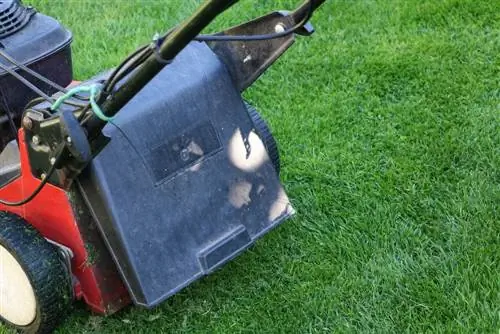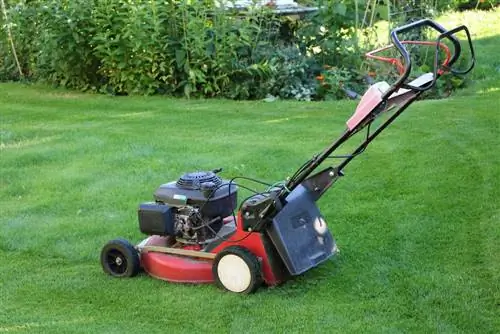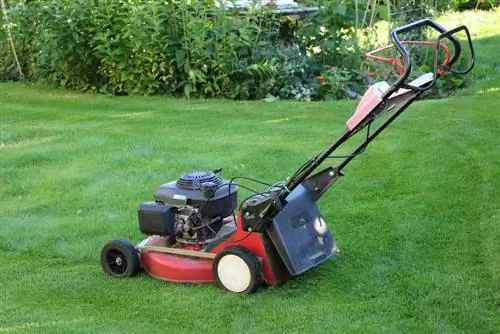- Author admin [email protected].
- Public 2023-12-17 03:39.
- Last modified 2025-01-24 12:45.
There are different types of lawnmowers with different operating volumes. The time frame in which you use which lawn mower and whether you are allowed to cut your lawn on Sunday is regulated by the Noise Protection Act.
Equipment and Machinery Noise Protection Ordinance
Mowing lawns has been covered by noise protection since 1992, although this was regulated and expanded in 2018 via the European Equipment and Machinery Noise Protection Ordinance. This involves limiting operating times based on official rest times and areas of use. The decisive factor for the various regulations is primarily the noise level of a lawn mower, which is tied to the respective noise limits.
Noise limits
The Noise Protection Act distinguishes between three noise limits. These determine which lawnmower is classified as quiet, moderately loud and very loud. According to these classifications, the times and days during which a lawnmower can be used are divided. There are also legally prescribed limits for certain types of lawnmowers.
Up to 88 decibels
- quiet devices
- mostly electric lawnmowers
From 88 decibels to 103 decibels
- medium loud devices
- mostly smaller petrol and more powerful electric lawnmowers
Over 103 decibels
- loud devices
- mostly old and/or powerful petrol lawnmowers
Tip:
If the old lawn mower is one of the noisy machines and is subject to time restrictions by law, the problem can be quickly solved by purchasing a new lawn mower. For several years now, manufacturers have no longer been allowed to market lawn mowers that are louder than 103 decibels. For smaller lawnmowers the limit is 96 decibels.
Weekdays

The lawnmower may be used on working days. In general, grass cutting is prohibited on weekdays between 8 p.m. and 7 a.m. in order to ensure nighttime peace and quiet. All types of lawn mowers fall under this regulation, regardless of whether they are classified as loud or particularly quiet. However, further time restrictions apply according to the respective noise limits. The following regulations apply:
Quiet lawn mowers up to 88 decibels
Lawn cutting permitted without restrictions on working days between 7 a.m. and 8 p.m
Petrol and electric lawnmowers from 88 decibels to 103 decibels
between 7 a.m. and 1 p.m. and between 3 p.m. and 8 p.m
Loud lawnmowers from 103 decibels
On weekdays only between 9 a.m. and 1 p.m. and between 3 p.m. and 5 p.m
NOTE:
Robot lawn mowers are also quiet devices and can be used between 7 a.m. and 8 p.m. on weekdays. They are often barely audible, so neighbors often don't even notice them. Specially quiet robotic lawnmowers are even available for use at night.
Saturday
Until 2006, Monday to Friday were considered working days. This was officially changed in 2006 so that Saturday is also a working day.
Sunday and public holidays
Although the use of a lawnmower also influences the permitted times, all types of lawnmowers are still prohibited from mowing on Sundays and public holidays, regardless of the respective limit value range.
Lunchtime
In most countries/cities, “lunchtime” is set between 1 p.m. and 3 p.m. However, this can vary by state/municipality/city. In some cases, the lunch break begins as early as 12 p.m. This is more common, for example, in spa areas.
Tip:
It is advisable to ask the responsible municipality what time includes lunchtime or generally quiet times in relation to noise protection regulations, to be on the safe side.
Exceptions

In rural regions and in areas where there is not a high population density, such as in industrial areas, the noise protection law does not apply. Here we are talking about so-called special areas, which are considered such if either the “normal” noise is equal to or exceeds that of a lawnmower and/or neighbors live further away, so that there is no risk of any disruption. The legal regulations in the village usually do not apply either.
Development plan as a basis
In order to assign an area to the exemption, it is not enough to classify it based on the existing development. The decisive factor for areas that are subject to an exception is the respective development plan of the building authority. For example, if a purely industrial area is listed there without any private residential development, then as a rule no “neighbor” can invoke the noise protection law if they feel disturbed by a “running” lawnmower during their afternoon nap during a work break.
Fine
Anyone who violates the noise protection law is committing an administrative offense that can be punished with a fine of up to 50,000 euros.






